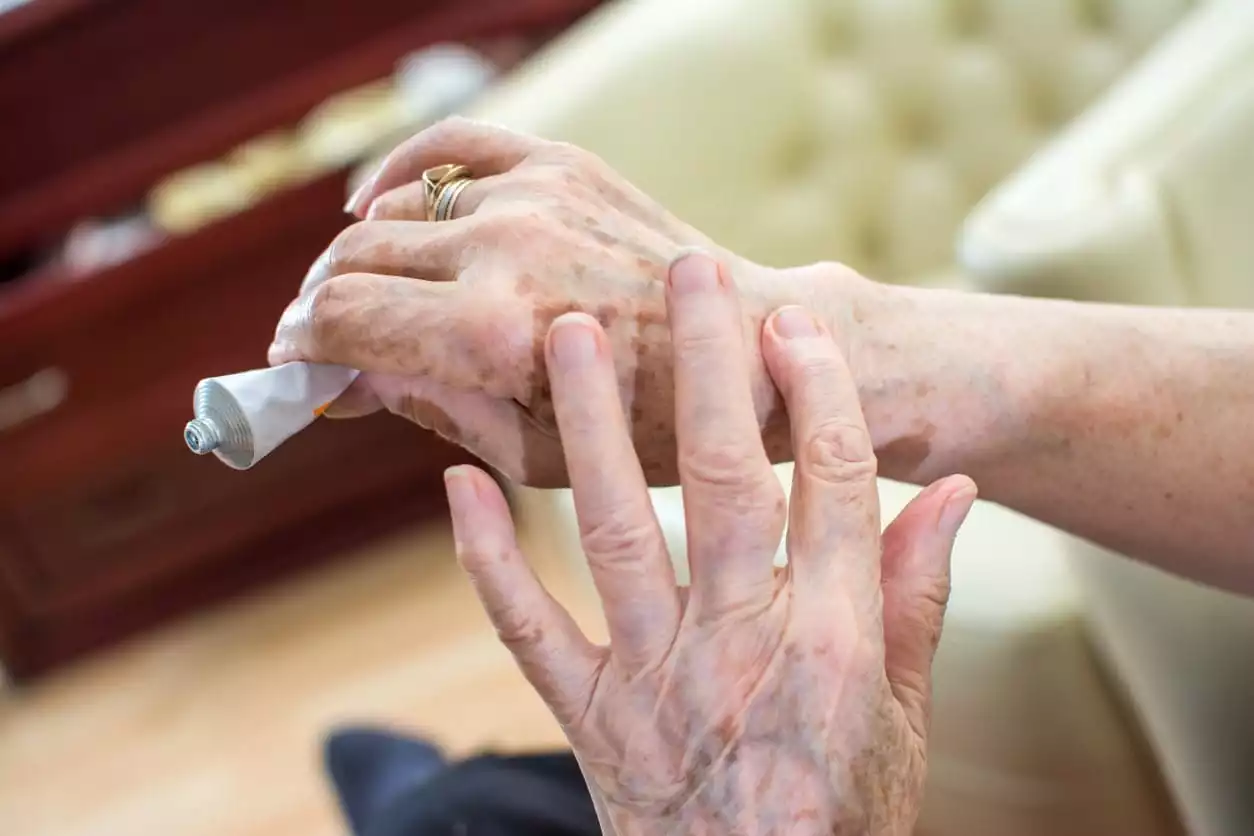
Treating skin conditions can be a difficult task, especially when it comes to treating melasma.
Your skin is your largest and most protective organ with the most exposure to the outside world. Its job is simple, yet critical: protect you from environmental toxins, everyday pollutants, and microbes.
Of course, it also keeps everything internal where it belongs, too; anyone who has been on the receiving end of a paper cut knows the importance of skin first-hand!
The Relationship Between Hormones and Skin Conditions
Unfortunately, your skin isn’t as resistant to hormonal fluctuations.
As you age, the level of certain hormones (like estrogen and testosterone) in your body changes. These changes sometimes lead to conditions like melasma.
In this post, we’ll reveal how these conditions develop, which risk factors make you more likely to be sensitive to hormonal fluctuations, and how you can combat them with compounded medicines.
What is Melasma?
Melasma is a common skin condition that causes brown to gray-brown patches of discoloration on or around certain areas of the body.
Often referred to as “age spots” or “liver spots,” these patches often appear on the face, neck, and hands, but are also commonly identified on the trunk or forearms.
Up to 90 percent of melasma cases involve women; in contrast, only 10 percent of men are affected.
Who Is at Risk?
Anyone can develop melasma, but the condition is more common in individuals who have darker skin tones.
Research shows that people who have a familial history of melasma may also be more likely to experience spots.
Sun damage can sometimes cause melasma; however, hormones are by far the most major trigger.
Women are more likely to experience spots as a result of hormone fluctuations, especially in pregnancy or when nursing. In fact, melasma is so common in pregnancy, some doctors refer to it as the “mask of pregnancy.”
Rarely, melasma may be caused by certain medications or skin care products, especially if they repeatedly irritate your skin. Over time, the constant irritation causes melanin to build up.
This form of melasma may be permanent or transient.
Other Hormone Issues Impacting the Skin
Pregnancy hormones aren’t the only ones wreaking havoc on the skin. Every hormone in your body works in harmony.
When hormone levels become maladjusted, it can cause a chain reaction that causes a myriad of difficult symptoms.
- Teens entering puberty may experience varying levels of acne.
- Adults with high stress levels may experience cortisol-related breakouts
- Women over the age of 40 with low estrogen may experience dry skin
- People with too much testosterone may struggle with oily skin
- Individuals with hyperthyroidism often have oily skin
- People with hypothyroidism often have dry skin
It isn’t always easy to detect a hormone-driven skin issue versus a condition caused by some other influence.
The only way to be sure is to run bloodwork to verify hormone levels. Hormone Replacement Therapy (HRT) can sometimes correct skin issues caused by conditions like these.
Treating Melasma: What Are the Options?
How quickly melasma clears up or lightens often depends on its cause.
Women who are taking hormonal birth control and/or who are pregnant often find melasma dissipates after they stop treatment or give birth.
Some women prefer treating melasma rather than choosing to stop taking birth control, while others may prefer to switch to another form of birth control instead.
Still others struggle with the condition permanently due to sun damage; this form of melasma usually won‘t dissipate without treatment.
Some of the most common medicines used for treating melasma include:
- Hydroquinone: Comes in a gel or cream. It is sometimes available without a prescription at low doses. Over-the-counter (OTC) treatments are occasionally enough for mild cases of melasma, but aren‘t robust enough for severe darkening. You may need to ask your dermatologist to prescribe something stronger.
- Corticosteroids: Decrease inflammation. These drugs may be useful for irritation-caused melasma and particularly tough cases, although they are not without side effects.
- Tretinoin: A derivative of Vitamin A. This drug actively lightens skin, lessening the appearance of melasma. It should be used cautiously in people with darker skin due to the risk of over-lightening.
- Azelaic acid: Brightens skin tone. This ingredient is also commonly used in the treatment of rosacea, teen acne, and adult acne.
- Kojic acid: Chelation agent sourced from various fungi (particularly Aspergillus oryzae). It is an extremely effective skin-lightening agent when paired with the right ingredients.
- Retinoic acid: Promotes faster cell turnover. Often referred to as “Retin-A, “it removes melasma cells and encourages proper pigmentation in newly-generated cells”.
- Arbutin: Similar to hydroquinone. The main difference between the two is that Arbutin is naturally-sourced. It is also far less irritating to sensitive skin.
When it comes to this skin condition, it’s often best to use multiple options for treating melasma.
Who Can Help With Melasma Treatment Options?
Your dermatologist will prescribe you a cream containing a combination of ingredients designed to work together to eliminate spots.
Alternatively, they may refer you to a compounding pharmacist. Compounding pharmacies can effectively create treatments specifically tailored to your melasma and general skin type.
Lifestyle Changes
Treating melasma isn’t always easy, but it is possible to significantly lighten or even eliminate it over time.
No matter what compounded treatment you choose, you should also make simple lifestyle changes to avoid worsening the condition.
When you spend time outside in the sun, wear sun protection including:
- Sunscreen
- Hats
- Sunglasses
- Other protective items
Most patients need maintenance therapy to prevent the recurrence of melasma.
Ongoing treatments may include high-SPF sunscreen or even a weaker topical formula; the goal is to keep your skin tone bright and even.
Treating Hormonal Skin Conditions
No two hormonal skin conditions are exactly alike; each may need a slightly different treatment plan.
- Teenage girls, for example, may find relief from severe acne if they take birth control pills to balance their estrogen levels.
- Sometimes, acne progresses so far that teens benefit from antibiotic creams and/or oral medication. Doctors reserve these more extreme treatments for serious cases that do not resolve with traditional cleansing protocols and creams.
- Women struggling with menopause or other hormonal shifts may find estrogen, progesterone, and testosterone creams helpful for controlling their symptoms. In fact, hormone creams are often the first line of defense in treating menopause, even before oral hormones are given.
In the case of treating melasma specifically, treatment may come down to trial and error.
Side effects include mild irritation as your skin adapts to the new ingredients in your medication, but these symptoms generally lessen after the first few uses.
Call your doctor right away if your skin becomes severely irritated or darkens during the course of your treatment. You may need to try a gentler formulation.
It’s important to remember that every patient is unique.
What works for one person may not work as well for you; that’s why compounded medicines are so effective in this application.
Your compounding pharmacy can create a custom-fitted formula that specifically targets your unique complaints with as few side effects as possible.
Other Skin Treatments
Topical medications are just one method for treating hormone-mediated skin conditions; other treatments are available.
Some cosmetic procedures (often performed by dermatologists and aestheticians), like dermabrasion, laser or light therapies, may be helpful, too. These treatments must be tailored to your skin type to avoid further irritation.
Hormonal fluctuations are no joke. The last thing anyone wants is to wake up with huge patches of discoloration or a bout of adult acne.
These conditions may be a fact of life, but they don’t have to be your entire life, either, especially with the right treatments.
Work with your dermatologist as your skin changes to stay on top of symptoms; the earlier you begin treating melasma, the easier it is to eliminate.

 info@burtsrx.com
info@burtsrx.com

